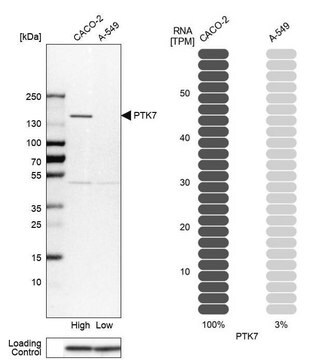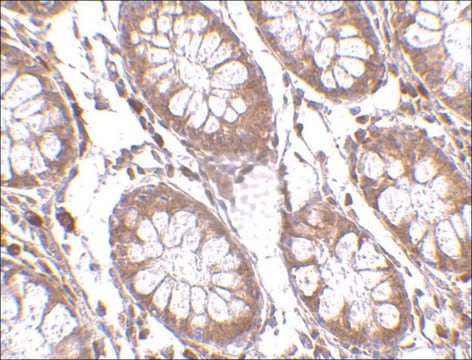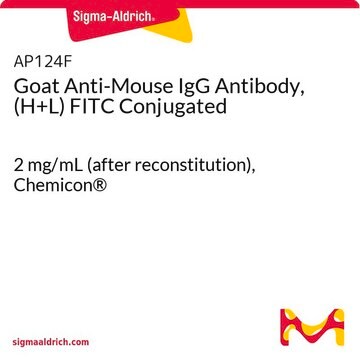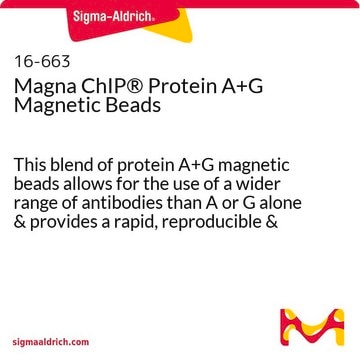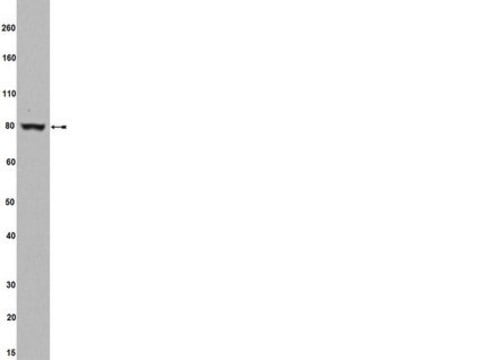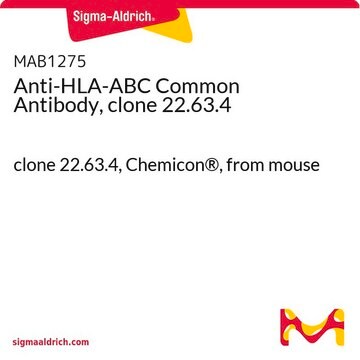MABN721
Anti-PTK7 Antibody, clone 4F9
ascites fluid, clone 4F9, from mouse
Synonym(e):
Inactive tyrosine-protein kinase 7, CCK-4, Protein-tyrosine kinase 7, Pseudo tyrosine kinase receptor 7, Tyrosine-protein kinase-like 7
About This Item
Empfohlene Produkte
Biologische Quelle
mouse
Qualitätsniveau
Antikörperform
ascites fluid
Antikörper-Produkttyp
primary antibodies
Klon
4F9, monoclonal
Speziesreaktivität
human
Methode(n)
immunohistochemistry: suitable
western blot: suitable
Isotyp
IgG1
NCBI-Hinterlegungsnummer
UniProt-Hinterlegungsnummer
Versandbedingung
wet ice
Posttranslationale Modifikation Target
unmodified
Angaben zum Gen
human ... PTK7(5754)
Allgemeine Beschreibung
Immunogen
Anwendung
Neurowissenschaft
Entwicklungsneurowissenschaft
Qualität
Western Blotting Analysis:A 1:1,000 dilution of this antibody detected PTK7 in 10 µg of A431 cell lysate.
Zielbeschreibung
Physikalische Form
Lagerung und Haltbarkeit
Handling Recommendations: Upon receipt and prior to removing the cap, centrifuge the vial and gently mix the solution. Aliquot into microcentrifuge tubes and store at -20°C. Avoid repeated freeze/thaw cycles, which may damage IgG and affect product performance.
Hinweis zur Analyse
A431 cell lysate
Haftungsausschluss
Sie haben nicht das passende Produkt gefunden?
Probieren Sie unser Produkt-Auswahlhilfe. aus.
Lagerklassenschlüssel
12 - Non Combustible Liquids
WGK
nwg
Flammpunkt (°F)
Not applicable
Flammpunkt (°C)
Not applicable
Analysenzertifikate (COA)
Suchen Sie nach Analysenzertifikate (COA), indem Sie die Lot-/Chargennummer des Produkts eingeben. Lot- und Chargennummern sind auf dem Produktetikett hinter den Wörtern ‘Lot’ oder ‘Batch’ (Lot oder Charge) zu finden.
Besitzen Sie dieses Produkt bereits?
In der Dokumentenbibliothek finden Sie die Dokumentation zu den Produkten, die Sie kürzlich erworben haben.
Unser Team von Wissenschaftlern verfügt über Erfahrung in allen Forschungsbereichen einschließlich Life Science, Materialwissenschaften, chemischer Synthese, Chromatographie, Analytik und vielen mehr..
Setzen Sie sich mit dem technischen Dienst in Verbindung.